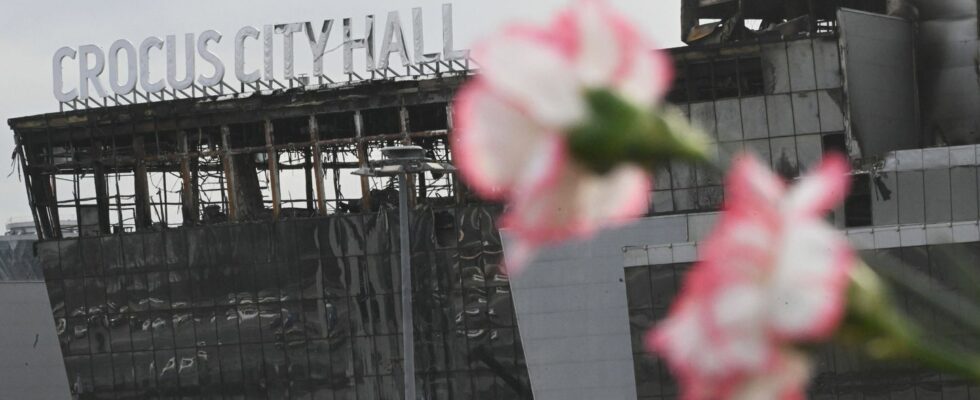The Islamic State of Khorasan (IS-K), a branch of the jihadist group Islamic State (IS), claimed responsibility for the attack on a concert hall in the suburbs of Moscow on Friday evening. Nearly 140 people have died, according to a latest report from the Russian authorities. Since then, many Internet users have wondered why ISIS would attack Moscow “all at once” and are launching the machine of conspiracy theories. Well, the Kremlin may have forgotten ISIS, but the terrorist group had not forgotten Russia.
For what ? Because the terrorist organization considers that Vladimir Putin’s country “has Muslim blood on its hands”. Wassim Nasr, journalist at France 24 and specialist in jihadism, even spoke this Saturday on France Info of a “blood debt” between Russia and ISIS “which goes back several years, to the war in Syria or Chechnya”.
EI-K, the branch Afghanistan’s bloodiest terroristand ISIS have been “fixated on Russia for two years, frequently criticizing President Vladimir Putin in his propaganda,” says Colin P. Clarke, terrorism specialist at the security consulting company Soufan Group, in the New York Times. 20 minutes make the point.
Privileged contacts with the Taliban
According to experts interviewed this week by AFP, EI-K accuses the Kremlin of cultivating privileged contacts with the Taliban, who took power in 2021 in Afghanistan. Taliban who, according to The Guardian, find themselves confronted “alone with the delicate security question facing IS” since American troops withdrew. The British daily argues that Daesh has made Russia a new enemy and is using “Afghanistan and Central Asia as a platform to strike Russia and Asia, and Turkey as a portal to Europe”.
In September 2022, Daesh claimed responsibility for the suicide attack against the Russian embassy in Kabul. But it was already the Islamic State which was involved in the bomb attack of April 3, 2017, in the Saint Petersburg metro. This March 7, Russian intelligence services also assured that they had foiled an attack by EI-K against a synagogue in the Kaluga region, southwest of Moscow. Suspected members of EI-K were reportedly killed there.
The Chechens, “rallied to the cause of jihad”
During the Chechen War, Chechen separatist rebels became radicalized. Some have pledged allegiance to ISIS. As a reminder, the country expressed demands for independence and Russia “repressed all ethnic or linguistic demands” with unprecedented violence, comments Guillaume Ancel, to our colleagues at BFMTV. These “ethno-separatist” type demands and which are part of a “recurrent anti-Putin context” were then “rallied to the cause of jihad”, specifies the former French officer and co-author of Goodbye Putin.
In 2002, Chechen fighters even took 912 people hostage in the Moscow theater of Dubrovka to demand Russian withdrawal from Chechnya. Results: 130 deaths, almost all as a result of asphyxiation at the time of the intervention of the police.
In the Russian Caucasus, a powder magazine
Moscow is therefore confronted with Islamist terrorism on its own territory, more particularly in the Russian Caucasus. Nearly 4,500 Russians from this region have fought or are still fighting alongside IS, according to authorities. At the beginning of March, Russian authorities announced that they had killed six suspected Islamic State fighters in an operation carried out in Ingushetia, a small republic in the Caucasus with a Muslim majority.
“At one point, ISIS had a form of emirate in the Caucasus which was eliminated by the Russians. Russian prisons are also full of jihadists from IS or other factions, so the dispute is very old,” comments Wassim Nasr to France 24. And we must not forget that the Islamic State of Khorasan, which “experienced a spectacular second wind in 2021”, according to The New York Times, saw its numbers increase from 4,000 to 6,000 men. According to a report from UN Security Council dating from June 2023its ranks also include families from Afghanistan, Azerbaijan, Russia, Pakistan, Iran, Turkey and Central Asia.
Support for Bashar al-Assad
And all of them served in Syria in particular. In 2015, Moscow intervened militarily to support the regime of Bashar al-Assad. So, certainly, Moscow was not on the side of the Western international coalition, but it was a decisive force in raising the Islamic caliphate. The Russian army notably carried out massive bombings targeting Daesh positions.
Against Wagner and the war in Ukraine
According to the American journal Foreign Policy cited by the BBC, shortly after the start of the war in Ukraine, ISIS launched a media campaign to “attract new potential sympathizers.” This is without taking into account that in the Sahel, “IS is confronted with the Wagner paramilitary group, and therefore with Russia. All these Russian interventions are so many reasons for ISIS to target Moscow,” recall our colleagues at TV5 World. And Lucas Webber, co-founder of the specialized site Militant Wire, explained to AFP that ISIS is “working on its expansion across Central Asia and Russia”, with even “a Russian-language media to strengthen its support and incite violence in the country.”
+ information on the attack in Moscow
This Monday, Vladimir Putin recognized for the first time that the attack had been perpetrated by “radical Islamists”, while continuing to mention a Ukrainian lead. Nikolai Patrushev, the powerful secretary of the Russian Security Council, insisted on Tuesday that, “of course”, Ukraine was responsible.

